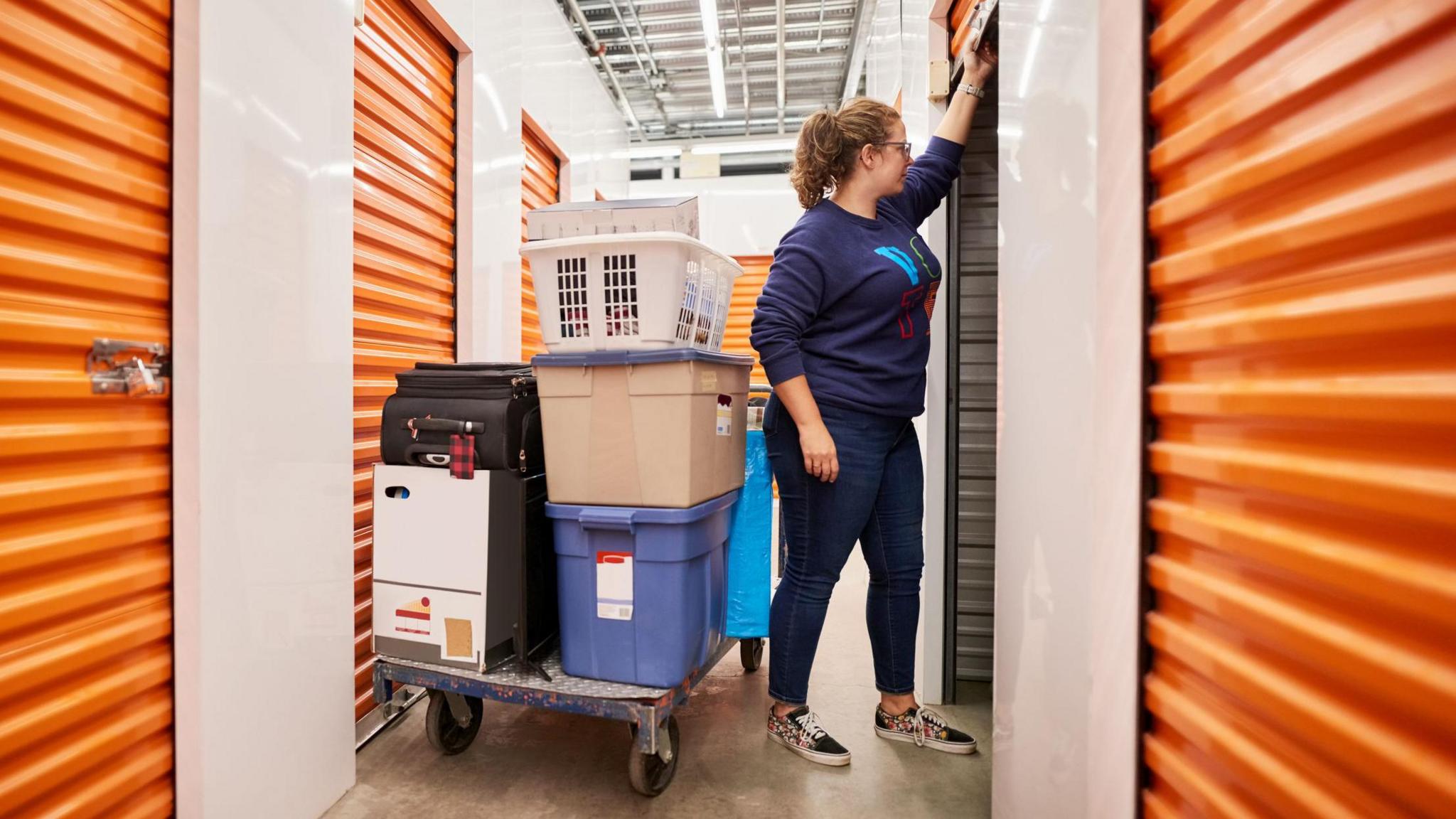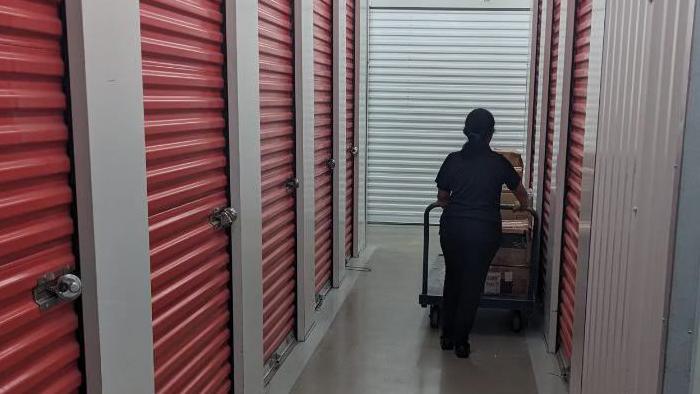What's behind the global self-storage boom?

Renting storage is much cheaper than renting an office
- Published
Walking the endless corridors of Apple Storage in downtown Toronto, it’s not hard to see why business is booming.
Behind one metal shutter, hundreds of candles are being boxed ready to be shipped around the world, behind another another an e-bike repair shop fixes transport for the city’s hundreds of delivery riders.
There’s even a locker full of bitcoin ATM machines, technology banned in the UK, but legal here in Canada, which enables bitcoin owners to exchange the digital currency for cash, or vice versa.
Showing me around the long, brightly lit corridors lined with rows of shuttered metal doors is David Allan, one of the owners. He says 70% of this facility is rented by businesses.
“In a pre-Covid world, office rents went to around C$60 ($44; £34) a foot, while you could get storage at the time for $30 a foot.
"So, instead of having sort of an interior office for file storage, firms moved into self-storage facilities because it was half the price or less, and they were able to use their offices in a more productive way.”
It's a worldwide trend. Storage companies are snapping up vacant commercial spaces abandoned after the pandemic. Meanwhile, as rents rise, consumers and business are looking for cheaper storage options.
In Canada, 16 new facilities opened their doors last year, adding an extra one million sq ft of space. Rents are up too - by an average of 12% from 2023 - according to StorTrack, who track industry data.
In the UK the industry made more than a billion pounds last year for the first time, according to a report, external from commercial property firm Cushman & Wakefield and the Self Storage Association.
In parts of Asia the so-called side-hustle culture is helping spur growth, according to Helen Ng, chief executive of the Self Storage Association Asia (SSAA).
She says that having a second job is more common in Singapore, and often involves keeping stock for an e-commerce business at a storage facility.
Ms Ng herself owns two self-storage facilities in Singapore, and says that almost half of her renters are using the units for a side-hustle.

Dean Booty "had no idea" his self-storage podcast would get thousands of listeners
The industry has been so popular with investors, it’s even spawned several podcasts advising would-be moguls on how to get into the business.
Entrepreneur Dean Booty from Beverley in East Yorkshire is one of them.
“I had a restaurant business, and it failed, and it was a miserable time for me and my wife. It was in the centre of a town where I lived in. It really hurt my ego.”
Mr Booty says this was the inspiration to share his success in self-storage with others.
His podcast Hacking Self Storage gets around 15,000 listens each month, he reveals, adding “I had no idea there was that many people interested in self-storage, which is incredible."
Mr Booty’s storage operation comprises just under 100,000 square foot in five locations across England, Scotland and Wales.
The 42-year-old father says he’d like to retire by age 50.
“There's massive amounts of money coming into the industry, which only means it's going to become more and more competitive, but at the minute, the demand is growing faster than the supply in the UK, which is incredibly exciting,” he adds.
But not everyone shares Mr Booty’s excitement.
“It’s an indictment of our housing crisis. Space shouldn't be a luxury in terms of living space,” says Ben Twomey Chief executive of housing campaign group Generation Rent.
He accuses the industry of “making lots of money from people not having room in their homes”.
“Not just to keep their items, but to live their lives, or to address mental health challenges they have from being in a small or overcrowded home.”

Most of Apple Storage in Toronto is leased to small businesses
Back in Apple Storage in Toronto, we step into a large, brightly lit locker, tools hanging from the walls, two electric bikes suspended on work stands.
Mechanics are hard at work. Kevin Tsui is one of them and says the e-bike repair business occupies multiple units in the building.
“It is relatively cheaper than having like a retail store to just do this sort of work. The reason our company chose this storage area was that we actually own a store that got demolished for condos. This was just an easy next step for us.”
Mr Tsui, originally from Hong Kong, explains that where he’s from most of the shops in malls look like storage units.
“In Canada we’re taking advantage of the fact that we have a lot of space, but that's slowly diminishing in the big cities. If you want enough space to do what you need, this is ideal.”
Helen Ng agrees, adding “urbanisation is just a fact of life. I don't know how practical it is to expect everyone to actually store their items at home.”